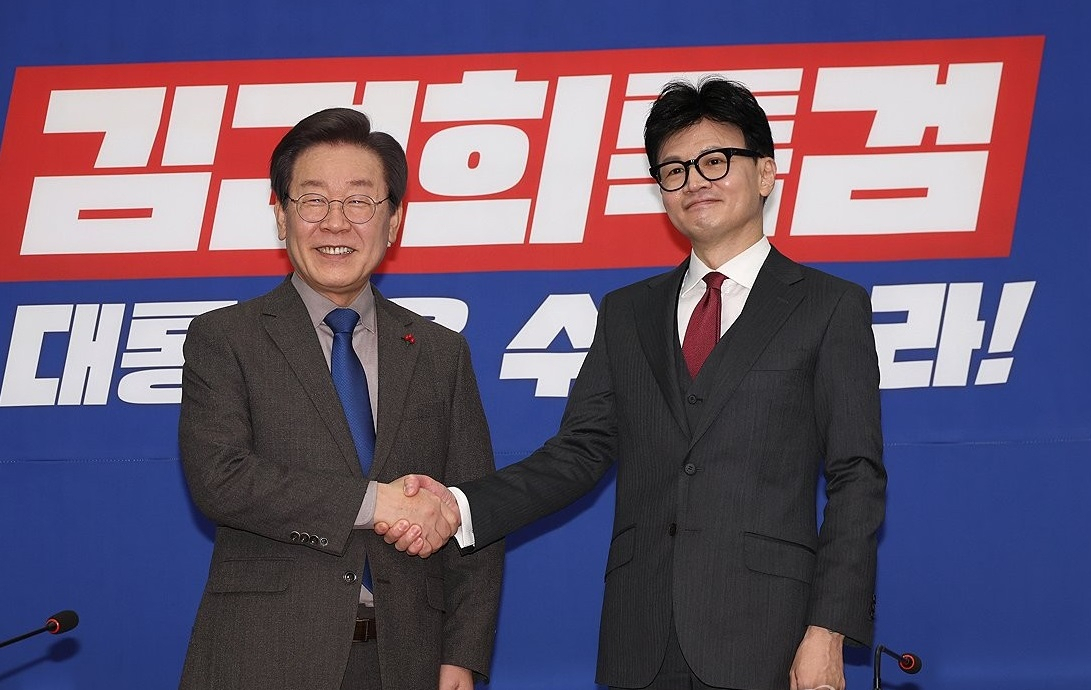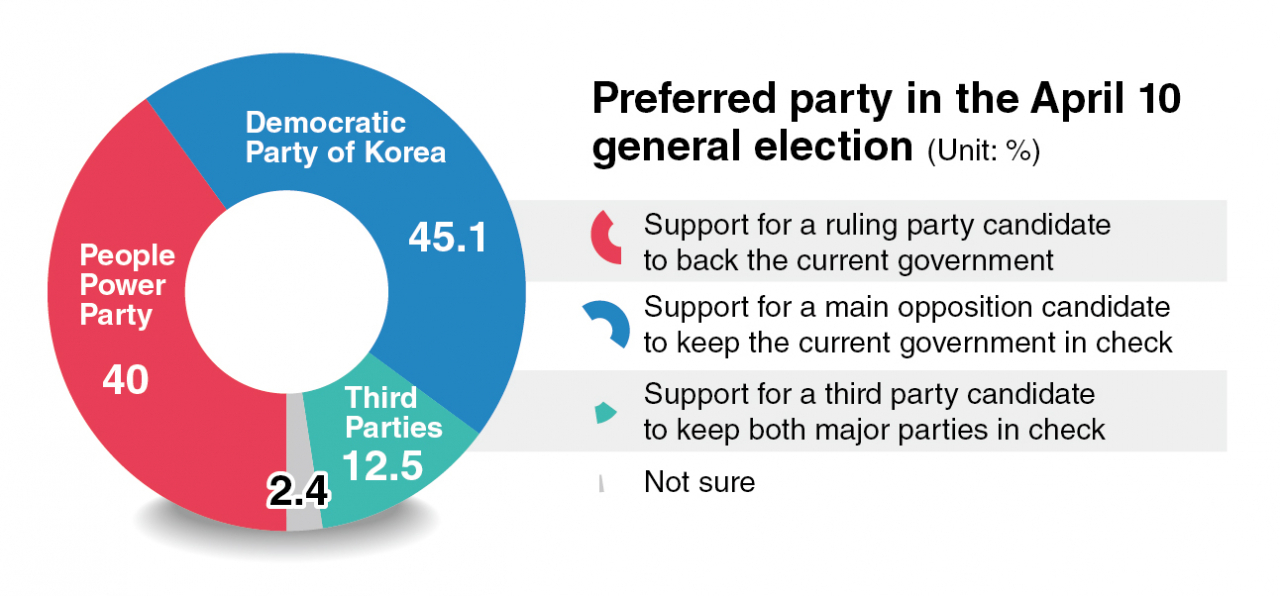Democratic Party gains momentum, takes lead in poll
By Jung Min-kyungPublished : March 31, 2024 - 16:38

Over 45 percent of South Korea's voters are leaning towards supporting candidates from the main opposition Democratic Party of Korea in the upcoming April 10 general election, to keep the Yoon Suk Yeol government in check. The results of a poll conducted by Jowon C&I, commissioned by The Korea Herald and Herald Business from Mar. 25 to 27, indicate a positive trend for the Democratic Party on Sunday.
Out of the total of 4,041 respondents aged 18 or older, 45.1 percent responded that "a candidate from the main opposition must be elected to hold the current government in check," expressing support for the Democratic Party.
The People Power Party received slightly less support, with 40 percent replying that "a candidate from the ruling party must be elected to support the current government."
Support for the Democratic Party exceeded that for the ruling People Power Party by more than ±1.5 percentage points, surpassing the margin of error.

Some 12.5 percent of respondents answered that "candidates from a third party must be elected to keep both parties in check," while the remaining 2.4 percent replied that they are "not sure or undecided."
By age, the main opposition party received overwhelming support from those in their 40s and 50s, with 58.4 percent and 51.9 percent, respectively. In contrast, the ruling party was preferred by voters in their 60s and those in their 70s and older, with 48.3 percent and 59.9 percent, respectively.
Younger voters were relatively more tightly divided, with 47.4 percent of those in aged between 18 and 29 supporting the main opposition party and 30.7 percent in the same age group picking the ruling party. For those in their 30s, 41.7 percent supported the main opposition, while 38.5 percent chose the ruling party.
The respondents that identified themselves as swing voters or moderates are likely to choose the main opposition party in the upcoming election, with 50.7 percent showing support for the Democratic Party this time. Some 33.6 percent chose the ruling party.
Jowon C&I analyzed that a "crucial aspect lies within the moderate voters."
"In this survey, a notable trend emerges as moderate voters gravitate making this election a judgment day for the current administration, creating a favorable scenario for the opposition. However, the ultimate determinant lies in voter turnout among key age groups, particularly the staunch supporters of each party: those aged 60 and above versus the 40s-50s age group," according to the polling company.
Among the third and satellite parties, the new liberal Rebuilding Korea Party, recently launched by former Justice Minister Cho Kuk, has emerged as a stronger-than-expected player.
While 35 percent said they would choose a proportional representation candidate from the People Future Party, the ruling party's satellite party, Cho's Rebuilding Korea Party closely trailed behind with 27.6 percent.

The Minjoo Union Party, the main opposition's satellite party, garnered 19.6 percent support, while 4.7 percent picked the New Reform Party, launched earlier this year by former People Power Party leader Lee Jun-seok and at the heart of a now-deflated "big tent" coalition of splinter parties.
Adopted here in 2020, the proportional representation system gives each party a proportion of seats based on the percentage of votes earned. There are 46 parliamentary seats of the total 300 open to be filled via proportional representation this year.
The survey employed the automated response system (ARS) polling method, engaging respondents through 100-percent random digit dialing on mobile phones. It rigorously ensured proportional representation across gender, age groups and geographical regions. The margin of error is ±1.5 percentage points, ensuring a 95 percent confidence level.
The People Power Party, Yoon's own political party, has struggled to win back voters while attempting to overcome multiple risks stemming from the current administration's moves in recent weeks.
Higher produce prices have weighed down heavily on the government and the ruling party, with Democratic Party leader Lee Jae-myung blaming the administration for the "collapsing economy and soaring food prices," at a recent campaign rally held at a local traditional market in Jamsil, eastern Seoul on March 24.
Korea's consumer sentiment index dropped to 100.7 in March from 101.9 observed in the previous month, marking the sharpest on-month slip since October, the latest Bank of Korea's monthly survey of consumers showed.
Earlier this month, the government appropriated 150 billion won ($111.4 million) to bolster subsidies and expand supply through direct imports following Yoon's orders to rein in food prices.
Voters will head to the polls to elect the 300-member parliament for early voting on Friday and Saturday, which will be closely followed by the official election day on April 10.





![[KH Explains] No more 'Michael' at Kakao Games](http://res.heraldm.com/phpwas/restmb_idxmake.php?idx=644&simg=/content/image/2024/04/28/20240428050183_0.jpg&u=20240428180321)





![[Grace Kao] Hybe vs. Ador: Inspiration, imitation and plagiarism](http://res.heraldm.com/phpwas/restmb_idxmake.php?idx=644&simg=/content/image/2024/04/28/20240428050220_0.jpg&u=)








